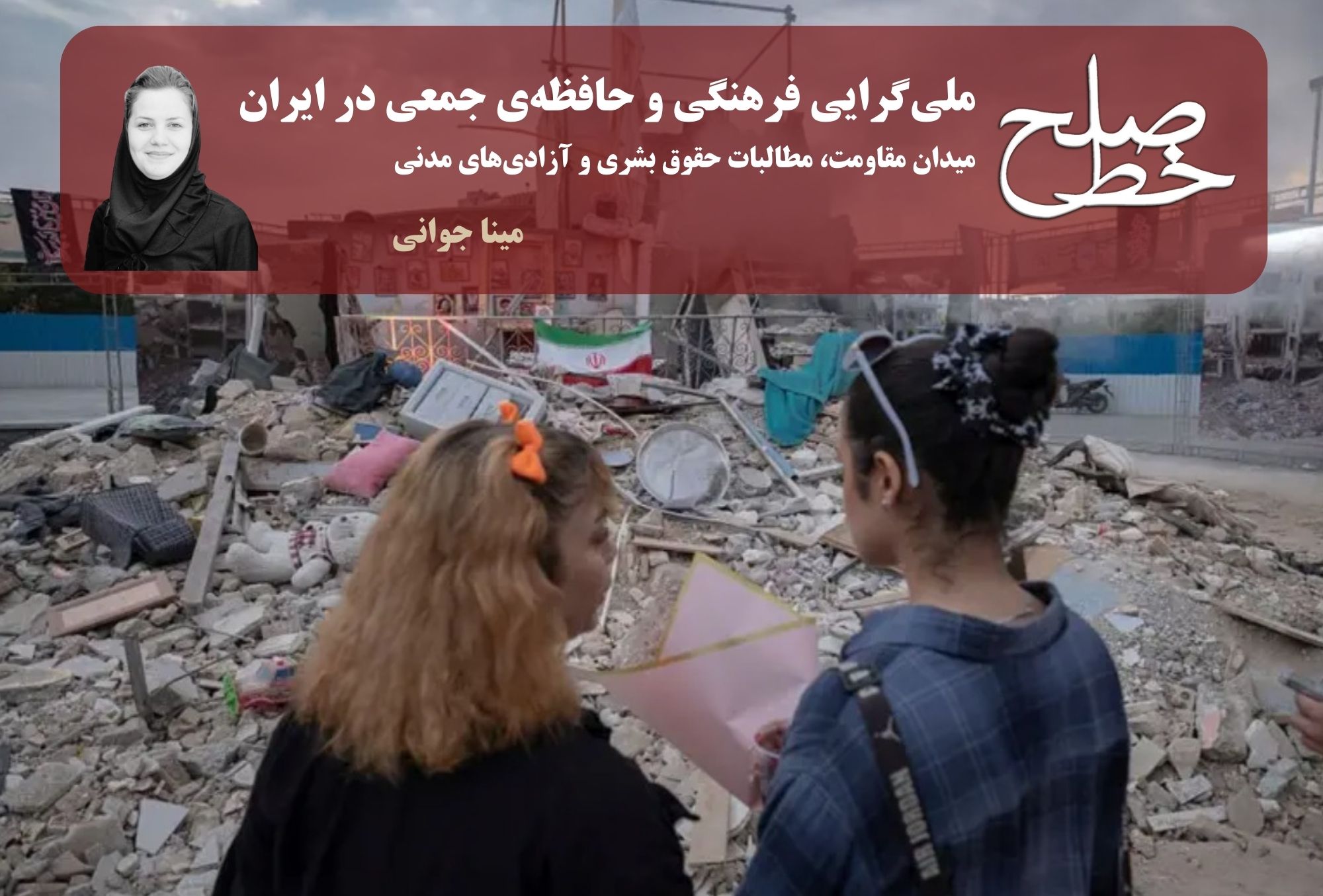Twelve-day war

Cultural Nationalism and Collective Memory in Iran/ Mina Javani
Collective memory in societies grappling with political crises and repressive structures functions not merely as a recollection of the past, but as a space for cultural resistance, redefinition of social identity, and advocacy for human rights. In contemporary Iran, the representation of national symbols—ranging from flags and cultural rituals to patriotic poetry and music—has taken […]...
Read More Created By:
Mina Javani
Created By:
Mina Javani
Mustafa Eghlima: People united during the 12-day war/ Ali Kalaei
The twelve-day war between Iran and Israel left deep and lasting consequences in Iran, bringing to light issues that are not only undeniable but also vital for understanding the social and political conditions of the country. This event, like a mirror, revealed hidden layers of inequalities, social divides, and structural challenges. In this conversation with […]...
Read More Created By:
Ali Kalaei
Created By:
Ali Kalaei
Amir Mahmoud Harirchi: Deporting Afghans is just sweeping the problem under the rug/ Pedram Tahsini
Migration is not a new story; it is an ancient narrative embedded in the annals of every nation’s history — filled with tales both great and small, of triumphs and defeats. But for the people of Afghanistan, this narrative is steeped in sorrow. It is a historical pain for our eastern neighbor, who also happens […]...
Read More Created By:
Padram Tahsini
Created By:
Padram Tahsini
Hope or fear after the ceasefire?/ Majid Shia Ali
The twelve-day war has ended, but the war conditions have not ended. The shadow of war still looms over Iranian society. The threat of war, missile attacks, explosions, assassinations, and Israeli security operations in Iran are still serious. The continuation of the war situation, the inability of the government to take action to address […]...
Read More Created By:
Majid Shia’ali
Created By:
Majid Shia’ali
Cold peace as a model of governance in the post-crisis era/ Mina Javani
After the end of the twelve-day war, the situation in Iran has seemingly entered a phase of stability; a phase that in political discourse is referred to as “mutual restraint” or “controlled tension”, but at a structural level, it is not only a sign of a return to normalcy, but also a continuation of the […]...
Read More Created By:
Mina Javani
Created By:
Mina Javani
A look at the execution policy following the twelve-day war / Marzieh Mohabi
The 12-day war between Iran and Israel was one of the most intense military conflicts in the region in recent decades and marked the end of a dream for the leaders of the Islamic Republic to eliminate Israel from existence. This conflict began with Israel’s surprise attacks on nuclear facilities, military bases, and the assassination […]...
Read More Created By:
Marziye Mohebbi
Created By:
Marziye Mohebbi
The Social Massacre of Afghan Immigrants / Amin Ghazaei
After the 12-day war between Iran and Israel, the Iranian government, which saw its security structure collapse, resorted to blind arrests and expulsions of over half a million Afghan nationals in just sixteen days. The Islamic Republic claimed that these unauthorized individuals were acting against national security and in favor of Israel. It is not […]...
Read More Created By:
Amin Ghazaie
Created By:
Amin Ghazaie
What is the ‘Defense Council’ and why was it approved and formed? / Sina Yousefi
In the month of Khordad of this year, Iran witnessed one of the shortest and most expensive military confrontations, known as the 12-day war. This war not only targeted vital infrastructure of Iran, including sensitive nuclear facilities and defense systems, but also exposed deep-rooted weaknesses in the structure of the Islamic Republic’s defense and security. […]...
Read More Created By:
Sina Yousefi
Created By:
Sina Yousefi
The consequences of the twelve-day post-war period: economic crisis, infrastructure collapse, and systematic violation of human rights / Ahmad Alavi
After the 12-day war between Iran and Israel, a destructive ceasefire was established. However, contrary to expectations of reconstruction and tension reduction, the structure of the Islamic Republic’s government intensified political and economic pressures, deepening existing crises. This note, with an analytical approach based on human rights indicators, examines the economic, social, and legal consequences […]...
Read More Created By:
Ahmad Alavi
Created By:
Ahmad Alavi
New Control Tool: Critics’ SIM Card Disconnect/ Fereshteh Goli
Nowadays, having a SIM card is one of the necessities of life in the digital and virtual world, and any deprivation of this right for anyone can be considered a tragedy. The International Telecommunication Union (ITU) has emphasized the importance of access to communication tools as a human right in several official documents, especially in […]...
Read More Created By:
Fereshteh Goli
Created By:
Fereshteh Goli
The right to access the internet is suspended/ Mohammad Hadi Jafarpour
A few days before the start of the twelve-day war, the issue of internet classification caused some political and civil activists to criticize the decision, referring to the president’s promise to remove filtering. Such restrictions on citizens’ rights are being imposed while in the country’s political-judicial structure, various rules and laws have been formulated and […]...
Read More Created By:
Mohammad Hadi Jafarpour
Created By:
Mohammad Hadi Jafarpour
Wounds that are still healing / Mahtab Alinjad
In the heart of the night, the sound of sirens passes through the sleeping cities. The sky is on fire, walls tremble, and the silence of homes is shattered. War, this merciless word, has once again awakened from the slumber of history and cast its shadow over the lives of humans. But amidst the ruins, […]...
Read More Created By:
Mahtab Alinezhad
Created By:
Mahtab Alinezhad